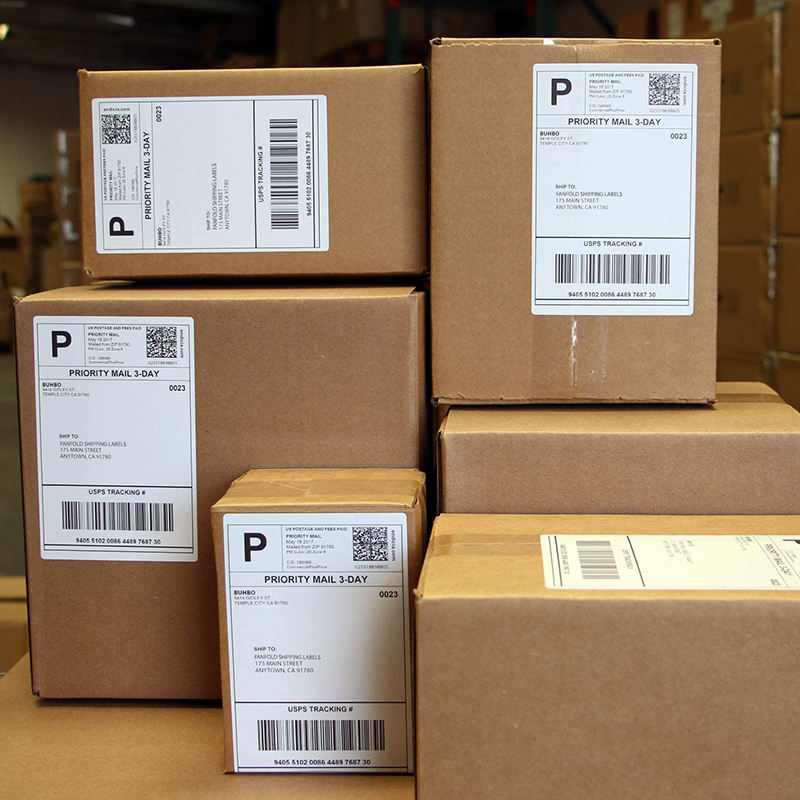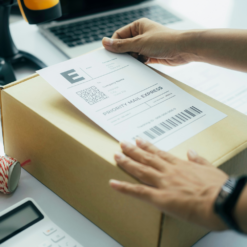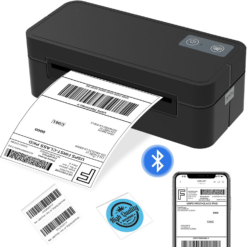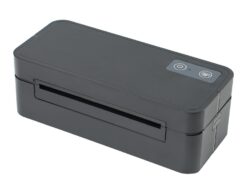Shipping Labels
Why Every E-Commerce Business in Kenya Needs Thermal Shipping Labels
As Kenya’s e-commerce sector continues to surge—powered by platforms like Jumia, Kilimall, Shopify, Woocommerce and countless independent online stores—the need for faster, more efficient, and professional product delivery is at an all-time high. Whether you’re fulfilling 5 orders a day or 500, there’s one small but critical component that can transform your logistics game: the thermal shipping label.
In this article, we break down why every e-commerce business in Kenya—whether you’re in Nairobi, Mombasa, Naivasha, or Athi River—should adopt thermal shipping labels, especially the industry-standard 4″ x 6″ (100mm x 150mm) format.
📦 What is a Thermal Shipping Label?
A thermal shipping label is a self-adhesive label printed using heat (no ink or toner required). These labels are durable, smudge-free, and cost-efficient—ideal for high-speed, high-volume e-commerce environments.
They contain:
- Recipient details
- Order numbers
- Tracking barcodes
- Carrier logos (FedEx, DHL, UPS, etc.)
- Additional info like weight, shipping service, and customs data
✅ Why Thermal Labels are a Game-Changer for Kenyan Online Sellers
1. No Ink, No Hassles
Traditional printers require frequent ink or toner replacements, which can be expensive and unreliable. Thermal printers use heat, eliminating the need for consumables while reducing operational costs.
2. Prints Fast and Clean
Thermal printers print at speeds up to 100mm/s, perfect for fulfilling multiple orders quickly. Labels come out dry, smudge-proof, and ready to apply.
3. Improves Professionalism
A printed shipping label makes your brand look serious and trustworthy. Handwritten addresses are prone to errors and delays.
4. Reduces Human Error
With integrated order management software, you can automatically print correct shipping details—minimizing wrong deliveries and refunds.
📏 Why the 4″ x 6″ (100mm x 150mm) Label Size Is the Standard
This label size has become the global standard for shipping, and for good reason.
🛫 Accepted by All Major Carriers:
- FedEx
- DHL Express
- UPS
- Aramex
- Posta Kenya (EMS)
- G4S Courier, Fargo Courier
When you print your waybill or shipping label in 100x150mm format, it fits directly into their scanning and sorting systems—ensuring quick processing and fewer errors.
📦 Preferred by Fulfillment Warehouses:
Even local fulfillment centers in Kenya (including Jumia logistics hubs and Courier Aggregators) request 4×6 thermal labels for:
- Uniformity
- Barcode legibility
- Easy label application
🛍️ Jumia’s Mandatory Label Policy for Vendors
In 2023, Jumia Kenya rolled out a policy requiring all vendors to affix self-adhesive printed shipping labels on each package.
Why?
- To speed up item processing
- Reduce sorting errors at hubs
- Enable barcode-based tracking
- Improve the unboxing experience for customers
Vendors are now expected to print Jumia-provided waybills—typically in 100mm x 150mm thermal format—and stick them directly on the product or envelope.
Without a thermal label printer, vendors are left printing on A4 paper, cutting, taping—slowing down operations and looking unprofessional.
🌍 Thermal Labels Are Crucial for Export Too
If you’re shipping orders outside Kenya (e.g., to Tanzania, Rwanda, UAE, Europe, or the U.S.), your shipping label is your export identity.
Customs officers, freight handlers, and last-mile delivery agents rely on clear and standardized shipping labels to:
- Scan barcodes
- Confirm origin and contents
- Track across international borders
Thermal shipping labels ensure that:
- Barcodes are scannable
- No smudging during transit
- All required data is present (sender, receiver, customs info)
Whether you’re exporting beauty products, electronics, apparel, or handmade crafts—this label format keeps your business compliant and credible.
🛠️ What You Need to Get Started
To implement thermal shipping labels, all you need is:
🔹 1. A Thermal Label Printer
We recommend the E41 Pro Thermal Printer, compact and cost-effective, ideal for 100x150mm labels. It supports USB and Bluetooth, works on Windows, Android, iOS, and macOS.
🔹 2. 4×6 Thermal Labels
These are pre-sized adhesive labels sold in rolls or fan-fold stacks. Simply load and print—no cutting or gluing required.
🔹 3. Label-Compatible Software
Print directly from:
- Jumia Seller Center
- Shopify or WooCommerce
- Courier APIs
- Microsoft Word
💰 Why It Saves You Money
While the upfront cost of a thermal label printer might be slightly higher than a basic inkjet, it pays for itself quickly:
- No recurring ink costs
- Zero downtime from smudged or wet labels
- Lower return rates due to incorrect shipping
- Higher customer satisfaction
For businesses doing 10+ orders a day, this is not a luxury—it’s an operational necessity.
📍 Serving Kenyan E-Commerce Hubs
We provide shipping labels and thermal printers to businesses in:
- Nairobi – Ecommerce sellers, fulfillment centers, couriers
- Mombasa – Exporters and freight forwarders
- Naivasha – Agri-exporters and greenhouses
- Athi River – EPZ packaging and logistics warehouses
With same-day delivery in Nairobi and next-day delivery countrywide, we make it easy to adopt the thermal labeling system.
If you’re selling online in Kenya, using 4×6 thermal shipping labels is no longer optional—it’s the new standard. From streamlining local deliveries to preparing export-ready shipments, these labels help your brand look professional, reduce error rates, and stay compliant with courier and platform requirements.
Whether you’re on Jumia, WooCommerce, Shopify, or just starting out, now is the time to upgrade your fulfillment with thermal shipping labels.




